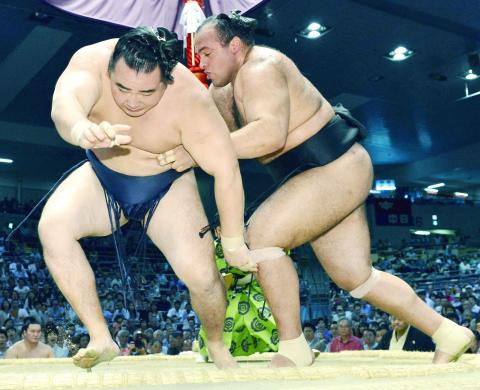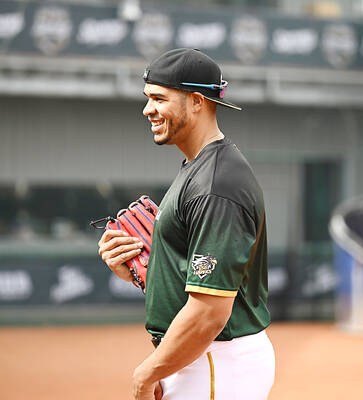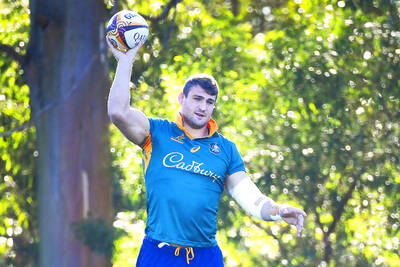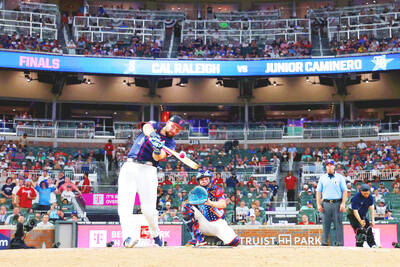Sumo wrestler Osunaarashi was a large, muscular Egyptian teenager with a passion for body building when a friend recommended he try the ancient Japanese sport of sumo.
However, it was a hard sell.
“This sport is about two elephants pushing each other,” he recalls thinking. “I’m a body builder, man. It’s so ugly for me, I will never do it.”

Photo: Reuters
Now Osunaarashi, 22, is the first Egyptian, first African, first Arab and first Muslim to muscle his way into sumo’s professional ranks, so proud of his heritage that he observed the Ramadan fast during a just-ended tournament.
This meant neither eating nor drinking from 3am to 7pm, despite grappling with wrestlers whose weight averaged 150kg in temperatures up to 33oC.
“The food was not a problem, but water was. It was the hardest part,” Osunaarashi said in an extremely rare interview at his lively sumo “stable,” as the wrestlers’ gym and residence is called, just outside the central city of Nagoya.
“Without Ramadan, I just have a small headache after the fight, but in Ramadan, in this tournament, every day I have a really strong headache that I never had before,” he said.
Bulking up is one of the principles of sumo, which pits two giant, glowering wrestlers, clad in loincloths, against each other. Bouts take place on a raised sand ring and the first wrestler forced out loses, with the outcome decided in seconds.
Slapping is permitted, punching and hair-pulling are not.
Sumo tournaments are broadcast daily, but fight for audience with sports like soccer. It has trouble attracting new wrestlers within Japan as the rigors of its daily life scare off enthusiasts.
Wrestlers down mammoth, protein-laden meals, often followed by naps. However, Osunaarashi, whose sumo name means “Giant Sandstorm,” forewent this during Ramadan, trimming about 5kg from his 156kg, 1.88m frame.
“You just have to do it,” he said as younger wrestlers made lunch and sang along to a television.
As is customary while relaxing, many wore only underwear — patterned boxer shorts — though Osunaarashi wore a green yukata, an informal kimono.
He shrugged off the fast as another challenge in adapting to the tradition-bound, 1,500 year-old sport.
“It’s part of life,” he said.
Born Abdelrahman Shalan near Cairo, he began body building at 11 and was 14 when he saw a fellow enthusiast do an unusual high, straight leg lift followed by a stomp. He asked if the man needed help, only to be told it was an iconic sumo move.
Persuaded to try “that ugly sport,” the teen eyed potential opponents at the sumo gym and expected to win.
“Then they made me fight the lightest weight. I was 120kg, he was 60kg. He kicked my arse seven times,” he said.
“When I went back home, even before taking a shower I opened my computer to know the meaning of sumo ... at 11 or 12 at night. I finished at eight in the morning,” he said.
He sought ways of getting to Japan while training and studying accounting. He finally made it in 2011, after winning several international amateur tournaments.
Although half the top-division wrestlers are foreign, mainly Mongolian, he was rejected by six stables before the Otake stable took him on.
There followed months of gruelling training and adapting to the language and traditions of communal life, including chores like cleaning toilets and preparing meals. Even Japan’s ubiquitous bows seemed odd.
“In Egypt, when you greet somebody, you don’t really bow your head. We always said you just do this for God, you don’t do this for other men,” Osunaarashi said.
Within two years, he made it to the top makuuchi division. By the most recent tournament, he was aiming for promotion to the fourth of nine ranks, an achievement that would improve his earnings and lifestyle.
His ultimate goal is to become a yokozuna grand champion, and he dreams of lifting the Emperor’s Cup for winning a tournament. He beat two yokozuna this tournament.
Osunaarashi fell one match short of a winning record, but remains determined to make history.
“I have to make my parents, my family, my country proud of me,” he said. “I have to prove [myself] to the people who said: ‘We don’t need you.’”

Tainan TSG Hawks slugger Steven Moya, who is leading the CPBL in home runs, has withdrawn from this weekend’s All-Star Game after the unexpected death of his wife. Moya’s wife began feeling severely unwell aboard a plane that landed at Taiwan Taoyuan International Airport on Friday evening. She was rushed to a hospital, but passed away, the Hawks said in a statement yesterday. The franchise is assisting Moya with funeral arrangements and hopes fans who were looking forward to seeing him at the All-Star Game can understand his decision to withdraw. According to Landseed Medical Clinic, whose staff attempted to save Moya’s wife,

Wallabies coach Joe Schmidt yesterday backed Nick Champion de Crespigny to be the team’s “roving scavenger” after handing him a shock debut in the opening Test against the British and Irish Lions Test in Brisbane. Hard man Champion de Crespigny, who spent three seasons at French side Castres before moving to the Western Force this year, is to get his chance tomorrow with first-choice blindside flanker Rob Valetini not fully fit. His elevation is an eye-opener, preferred to Tom Hooper, but Schmidt said he had no doubt about his abilities. “I keep an eye on the Top 14 having coached there many years

ON A KNEE: In the MLB’s equivalent of soccer’s penalty-kicks shoot-out, the game was decided by three batters from each side taking three swings each off coaches Kyle Schwarber was nervous. He had played in Game 7 of the MLB World Series and homered for the US in the World Baseball Classic (WBC), but he had never walked up to the plate in an All-Star Game swing-off. No one had. “That’s kind of like the baseball version of a shoot-out,” Schwarber said after homering on all three of his swings, going down to his left knee on the final one, to overcome a two-homer deficit. That held up when Jonathan Aranda fell short on the American League’s final three swings, giving the National League a 4-3 swing-off win after

Seattle’s Cal Raleigh defeated Tampa Bay’s Junior Caminero 18-15 in Monday’s final to become the first catcher to win the Major League Baseball Home Run Derby. The 28-year-old switch-hitter, who leads MLB with 38 homers this season, won US$1 million by capturing the special event for sluggers at Atlanta’s Truist Park ahead of yesterday’s MLB All-Star Game. “It means the world,” Raleigh said. “I could have hit zero home runs and had just as much fun. I just can’t believe I won. It’s unbelievable.” Raleigh, who advanced from the first round by less than 25mm on a longest homer tiebreaker, had his father